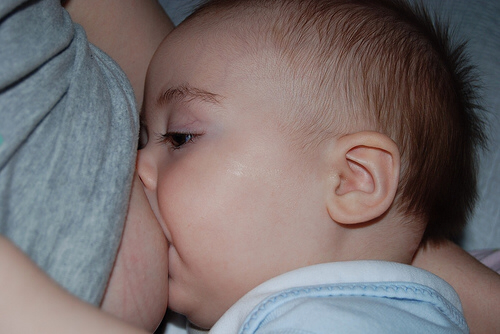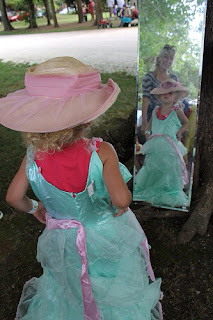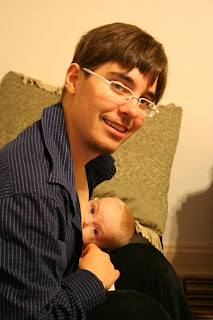So far, this blog has exclusively addressed issues faced by transmasculine folks. I started writing it from my personal experience, and I am transmasculine. However, I've received several questions from trans women who are interested in breastfeeding. After doing some Google searches, I realized that just as there is little to no information for trans men on this topic, there is not much written for trans women. In particular, I haven't found any personal accounts or interviews. I will try to do my part to fill a little bit of this gap. This is part one of a mini-series on trans women and lactation. Enjoy!
Trans women, individuals who were assigned male at birth but identify and live as women, CAN breastfeed. It is possible, and totally awesome! Health care providers, volunteer breastfeeding counsellors, and trans women themselves need to learn this important, empowering fact.
Over the last few weeks, I spoke a couple of times with a trans woman and mother, who we'll call Sarah, to better understand how she became a parent and successfully induced lactation. Sarah's baby is now more than a year old and they still enjoy a wonderful breastfeeding relationship. I'll give a bit of background here on conception and then launch into our lactation interview.
Sarah and her wife are both genetic parents to their baby. Sarah explained to me that many doctors, endocrinologists and trans women erroneously believe that after taking antiandrogens and hormone replacement therapy for a relatively short period of time (depending on who you're talking to, they may say something between six months and two years), a trans woman will be permanently infertile, despite not having had 'bottom surgery'. This is to say that even if she halts her hormone therapy, it is claimed that she will not be able to produce viable gametes. Sarah believes this claim is based not on science, but on a widespread lack of understanding of trans women’s bodies and many healthcare professionals’ lack of interest in helping them preserve their fertility.
Despite having taken hormone replacement therapy and antiandrogens for 5 years, Sarah was still able to produce what she calls ‘baby-making ingredients’ following a six-month cessation of her medication. Trans women hoping to help make a little munchkin should note that it takes about three months for their gametes to grow and mature. In addition, this genetic material is very sensitive to heat and needs to develop away from the body, below core body temperature. A trans woman who usually ‘tucks’ will need to change how she dresses for a while to regain her fertility.
Sarah banked her gametes, a choice she believes all trans women should be offered. Another five years later, when she and her wife decided to conceive, Sarah went off her hormones once again to obtain a fresh DNA contribution if possible. She was again successful, after a total of ten years on hormones and antiandrogens. The couple was able to conceive at home, an option that was far less expensive than using the previously banked material at a clinic.
They chose to have a homebirth because they wanted to avoid unnecessary medical interventions. As a lesbian couple, they were also worried about their relationship being questioned by hospital employees.
SARAH: We had the most incredible midwife for the birth. When we first met her, we explained our situation, and she used the term "non-gestational mom," which I’d never heard before. I loved that when confronted with a situation that had been confusing for so many doctors and nurses, she had a perfect, descriptive word for my relationship to my baby, right on the tip of her tongue and didn’t stumble over whether to use ‘non-biological’ or ‘donor’ or something else inappropriate. I'm one of the two genetic moms of my baby, but I'm the non-gestational mom.
ME: So you didn't have to educate your midwife at all about trans issues. That's awesome! What steps did you take to induce lactation? Which health care providers did you approach for help?
SARAH: I didn't know where to start. I looked through my health insurance booklet for an endocrinologist. There was a section that said "reproductive endocrinologist," which sounded just right. I called a couple of different offices until I got someone to call me back.
I said to the nurse, "Here's what I'm looking for. I know that this doctor doesn't have any experience with this, because NO ONE has any experience with it. I'm not looking for her to know what's going on, but I have an idea what I want to do, and I think I know what I need. I just want somebody to work with me."
When I saw the doctor, she said, "I think this is very unlikely to work, but I'm happy to help you try."
I didn't feel like she added that much to the process, other than prescribing the hormones I needed.
ME: When did you first think that you might breastfeed?
SARAH: We definitely thought about it before we got pregnant. It had been a vague part of our plan. I was inspired by the book, Confessions of the Other Mother: Non-Biological Lesbian Moms Tell All. As an aside, I really don’t like this use of the word ‘non-biological,’ referring to both parents and trans people. Just because we transitioned, or just because someone's not genetically linked to their child, that doesn’t mean we’re made of styrofoam. We’re flesh and blood, we have real live bodies that are ours, and that hold and love our children. There is no such thing as a non-biological person. But reading the book was really worthwhile, and one of the things that struck me was the difference in a mom's experience when she had not had a breastfeeding relationship with her baby. I wanted our roles in caring for our baby to be defined as little as possible by who gave birth to him, and for us to be able to give the same kind of comfort to him. As we started reading more, I got pretty attached to the idea of breastfeeding and really hoped it would work out.
ME: What medications did you take to induce lactation?
SARAH: People sometimes say that birth control pills ‘simulate pregnancy.’ Another effect of this medication is to stimulate the development of breast tissue. If you haven't been through a normal female puberty and haven't had progestins in your system, birth control pills are necessary to help build milk ducts and glandular tissue. Estrogen increases during pregnancy, and then after birth it drops sharply.
I modified the Newman/Goldfarb protocol for induced lactation a bit, since I was already taking hormones. I started replacing my usual estrogen with birth control pills (Nortrel 1/35, each pill contains 1mg of a progestin and 0.035mg of synthetic estradiol) about six months before our baby's birth. Closer to the due date, I added half my regular dose of estrogen, and then stopped taking it after the birth. Two weeks after the birth I started pumping and taking domperidone. [Note: Domperidone is a drug generally used to control nausea, but has the side effect of increasing lactation output, often quite dramatically. Domperidone for breastfeeding support is an off-label use of the drug. It can be difficult to obtain for that purpose in some countries such as the US. In others, it is much more commonly available.]
ME: We know that breastfeeding works via a supply and demand system. If the baby does not take enough milk from the gestational mother, her body will produce less milk as a result. If the baby nurses more and demands more milk, the gestational mom will produce more. In the early weeks, the amount that a baby nurses and draws milk helps to determine the gestational mother's milk supply later on. Having the baby nurse from you, Sarah, would also increase your supply, since a healthy baby is more efficient than a breast pump at removing milk from the breast. What did you do after your baby was born? How did you protect your wife's milk supply while bringing in your own?
SARAH: We wanted my wife to breastfeed him exclusively for about the first 4-6 weeks so that she could establish her supply. I pumped during that time. After about the third day of pumping, I started to produce some milk. It was weird, because I was used to pumping and pumping and not getting anything. I looked down that day and there were tiny milky droplets, and they were firm, almost like wax. I kept pumping, and I kept getting that weird consistency, and then the next day, it was softer. It got thinner until it was just milk. I didn't expect it to come in like that – it didn’t come in all at once like my wife’s milk did after she gave birth. It came gradually and it took days before the first drop fell into the pump bottle. But it looked like milk, smelled like milk, and tasted like melted ice cream. You could put it in your coffee or whatever!
ME: How was your experience of latching your baby in the beginning?
SARAH: It probably helped that it wasn't his first attempt. He pretty well knew what he was doing. He’d been nursing on my wife since he was five minutes old. I did find that, especially when I was very full of milk, my breasts were not really soft enough to go into his mouth. Some lactation consultants recommend making a sandwich to help smush your breast into the baby's mouth, and I had to do that. When he was little, I don't think he could get my breast far back enough in his mouth to trigger the sucking reflex without quite a bit of help from me. But after a few months I didn’t have to do that anymore. My wife and I both had more issues with nursing early on than we do now, because when babies are so small, you can't really get very much [breast tissue] in and you have to hold their head at just the right angle.
ME: Yeah, it gets so much easier as they get bigger and stronger. How did you and your wife share nursing duties?
SARAH: When I started nursing, my milk came in quite slowly, so it didn't seem to have any effect on my wife's supply. I would pump every time he nursed on her, and at first, she would try to pump every time he nursed on me. That way we wouldn't be hurting each other's supply. After a couple of months, we stopped pumping. We were sharing nursing and had a freezer full of milk – we decided to just let it be. Neither of us had enough milk to keep him happy all day long, but we both stayed home from work for quite a while so it worked out well.
ME: How was the experience of co-nursing overall?
SARAH: The breastfeeding relationship with my son is so amazing, it's more wonderful than I ever imagined. I feel so connected to him, and he is so bright and independent and I think part of that is having such secure attachments to both his moms. Plus, it's incredibly convenient. I think all parents who can manage to do it should try. In the early months we got twice as much sleep because we were cosleeping and he just rolled back and forth between us to nurse when he needed to. ["Or half as much sleep", Sarah's wife joked.] Either of us could take him out for an afternoon without worrying about bottles or getting him back home in time for a feed.
Then when our baby was about six weeks old, my wife had to go to the hospital for surgery. She was there for almost a week.
ME: Wow, how lucky that you were both nursing then!
SARAH: It was really, really lucky. We didn’t get good breastfeeding support from the hospital. We had doctors insisting she not breastfeed because of medications when our midwife and lactation consultant knew it was fine. They gave us no support with pumping. I think that for a lot of moms a situation like that could have been the end of the breastfeeding relationship, and it was a huge help that we were both able to nurse him.
ME: Do you have any idea how much milk you ended up producing?
SARAH: It's changed over time. I'm working outside the home now. I was pumping at work for the first four months, but he’s nursing less now and I’ve stopped needing to pump. Our baby is eating solid foods really well now. He still loves nursing and when he comes home he really wants a feed. Back when we were full on breastfeeding exclusively all the time... when I woke up in the morning if I hadn't nursed a lot overnight, I could pump and get 4 ounces.
ME: That's amazing! Lots of gestational moms have trouble pumping that much.
SARAH: Yeah, I had a lot of milk! I didn’t expect inducing lactation to work so well. When my wife was in the hospital and he was nursing on me all the time, I did have quite a bit of pain. We sorted that out with our midwife who realized I probably had low-grade thrush, which makes everything very painful. At first, I thought, "It must just hurt to breastfeed this much." I found out that it wasn't normal and we fixed it.
ME: Are you still taking domperidone now?
SARAH: I tried to wean off domperidone. The dose you have to take to induce lactation is quite high. I slowly reduced my dosage. I found though that if I took less than four 10 mg tablets per day, then my supply really suffered. The protocols for induced lactation say that if you take domperidone, you will probably need to take it until you wean. It's not quite the same self-regulating supply and demand system as experienced by a gestational parent. Also, I'm taking half of my pre-breastfeeding dose of estrogen, which is not recommended while nursing because it can have a negative effect on milk supply. It is considered safe for the baby though.
As well, I'm currently taking one combination birth control pill that is mostly a progestin. A lot of literature says that progestin is not advised for trans women because there is supposedly 'no benefit' to it: it doesn’t increase breast size over estrogen alone. But that is not why I take it. When I was preparing to induce lactation [and taking progestins], my moods were so fantastic. I felt much more calm and loving, and I just really liked how I felt in myself. So, I decided after being just on estrogen for a while that I wanted to go back to having a progestin as well.
ME: Did you try to get help with lactation from any other care providers besides your midwife and endocrinologist?
SARAH: I wrote to La Leche League through their web site where you can send a message to a local volunteer. I asked if they knew anything about what we were trying to do. The response I got back was from somebody saying I didn't have real breasts so I obviously couldn't breastfeed. It was from somebody definitely not educated about trans issues. I think this is actually quite commonplace among health care providers, too. I don’t know what goes on in some people’s heads about trans women – I guess they think we all strap on rubber boobs or something? Yet some feel qualified to give medical advice in spite of their total lack of knowledge.
ME: People also focus so much on the amount of milk that is made and not on the relationship. So what if you didn't produce a drop of milk?
SARAH: Yeah, exactly. People should be supported to breastfeed however they can do it. I think it's a shame that so many people don't think about trans people's bodies being capable of breastfeeding, and that they don't consider and value the breastfeeding relationship. They think it's just about gestational moms and that no one else can do it. That presents two problems: how they think about breastfeeding, and how they think about trans people as well. Health care providers need to be more flexible and help trans people have more control over our own healthcare. We deserve to have the same choices that most other people have when it comes to our fertility and to caring for our children.
Big thank you to Sarah for sharing her thoughts and experiences with us! Read the next post in this series on trans women and lactation – I spoke with lactation consultant, Mary Lynne Biener, and Dr. Jack Newman from the International Breastfeeding Centre in Toronto, and with Diana West, IBCLC.
Read my interview with Jenna, another trans woman who breastfed her baby.
Did you find this post helpful? This blog is not supported by ads, so please consider making a donation using the button on the side.



![Buck Angel By Buck Angel (Buck Angel Entertainment) [CC-BY-SA-3.0 (http://creativecommons.org/licenses/by-sa/3.0) or GFDL (http://www.gnu.org/copyleft/fdl.html)], via Wikimedia Commons](https://blogger.googleusercontent.com/img/b/R29vZ2xl/AVvXsEic6fvx0AwdnBEKmN44P6OIKG7EXgS7TFIJ2iugGeP1ZX6qLKUiKSZKGFUnGC7HyOkc5T03WY1ldctBg3gzQgyoj25nvSUt1qtUInsgP_wNtWtmLZDsY5JwIe6aQmAg_liKFzWHlxg548s/s1600/buck.tiff)



